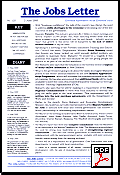



|
 |

|
| No.187 | 18 June 2003 | Essential Information on an Essential Issue |
of key events over the last few weeks. 
UNEMPLOYMENT HITS AMERICA HARD OECD: WHAT WORKS IN WELFARE ACT ON BENEFIT SANCTIONS SOCIAL WORKER EXODUS CALL CENTRE SKILL SHORTAGES KATHERINE RICH TOOLS FOR SCHOOLS SHADBOLT STILL ON THE JOB GREENS CRITICISE BIG BOX STORES GENEROSITY AND SILENCE  LAST Letter
LAST Letter
NEXT Letter   Download this issue as a PDF file
Index to Features
28 May 2003Thames Timber mill cuts 70 jobs and reduces its capacity from two shifts to one. Chief executive Tony Johnston blames the cuts on a drop in US demand for the mill's products and the rising NZ dollar. Last year the mill invested in new machinery and increased its staff by 90. Australia's Telstra cut 2,800 jobs last year and intends to shed about the same number again in 2003. 29 May 2003Kevin Hackwell of the Wellington Downtown Community Mission is opposed to time limited benefits, as suggested in the National Party welfare discussion document. "Most people would love to be in work or have a decent income. If you time-limit benefits all you're doing is punishing those individuals for the fact that there aren't enough jobs in the economy for them." 1 June 2003Singapore Airlines is set to cut jobs for the first time ever. 2 June 2003IT employment agencies report 43% growth in notified vacancies this year, according to a Hays Personnel survey. 3 June 2003The Kinleith pulp and paper mill near Tokoroa resumes operation after the settlement of a 82 day strike. The Mayor of South Waikato Gordon Blake says it will take months for the local economy to rebound from the effects of the strike. Blake: "The money-go-round stopped during the strike and it won't start up again straight away because the workers have bills and mortgages to pay first." Australian unions and the Victorian State government warn that more than 30,000 jobs could be lost in the clothing, textile and footwear industries if the federal government cuts tariffs. The Australian Productivity Commission has recommended that at the end of five years, tariffs on these goods should be reduced to 5%. G8 leaders meet in France. Police keep an estimated 50,000 protesters outside a 50km radius from the meeting held near Geneva. 4 June 2003Australian publisher Fairfax, owner of nine NZ daily newspapers, three weeklies, 61 community newspapers and 13 magazines, is eyeing-up cost savings that could bring about significant job losses. Bill Ralston, in The Independent, suspects that Fairfax will attempt to rationalize the number of editorial staff by having fewer staff write for more newspapers. The Council of Trade Unions appoints Carol Beaumont as its new secretary. Beaumont says she will campaign against youth wage rates, which she condemns as the last bastion of overt pay discrimination. Minister of Education Trevor Mallard returns from a trip in which he has been promoting NZ as a destination for Middle Eastern tertiary students. Most foreign students in NZ are from Asia and Mallard says that diversifying will help avoid the risks associated with the industry relying on students from a single region. 5 June 2003The Reserve Bank of NZ cuts interest rates from 5.5% to 5.25%. Floating home interest rates now vary between 7.35% - 6.65%. 6 June 2003The Employers and Manufacturers Association maintains that a change to the Holidays Act allowing all workers four weeks annual leave would make employers less likely to employ new entrants to the workforce, particularly the young and migrants. PM Helen Clark opens the new distribution centre of The Warehouse retail chain in Rolleston. The centre is the size of six football fields and will employ up to 100 people at peak times. 9 June 2003Minister of Social Development Steve Maharey says that National's continuing attempts to paint welfare as a dependency problem is simply wrong. Maharey: "The vast majority of people who find themselves in need of income support want to improve their lives and they want a job. What people on welfare need are opportunities, and when those opportunities are there, welfare numbers fall." Progressive Coalition Party deputy leader Matt Robson says it is time to legislate to give all working New Zealanders the four weeks annual leave that well-paid people already enjoy. 11 June 2003The government is limiting the growth of rolls in tertiary education institutions in order to avoid a budget blow-out next year. The move has been prompted by enormous enrolment growth in some institutions, particularly by Te Wananga o Aotearoa. Tens of thousands of French workers strike, putting pressure on the government over plans to overhaul the retirement system. The French government argues that their current pension scheme will be unable to support the aging population and is in danger of collapse. 12 June 2003The Minimum Wage Amendment Act is passed. It will ensure that workplace trainees are paid at least the youth minimum wage. The Australian unemployment rate drops to 6% for the second time this year. 14 June 2003Sealord's Tahunanui shellfish processing factory cuts 26 management and supervisory jobs. 16 June 2003Minister of Trade Negotiations Jim Sutton tells the Guild of Agricultural Journalists that the direct employment effect from the Uruguay Round of the WTO negotiations was 2,700 NZ jobs last year. Suttons claims the ripple effect through the economy would have increased this number to 17,600 jobs.
 LAST Diary
LAST Diary
NEXT Diary 
|
UNEMPLOYMENT HITS AMERICA HARDParadoxically, the United States economy has been growing for about a year, and this has sparked debate over the definition of the term "recession". The National Bureau of Economic Research, the academic body that announces the beginning and end to US recessions, has not sounded the end of this recession because economic growth has not been accompanied by job growth. Committee member Robert Hall: "I don't want to say that a recession is over if more and more people are unemployed and job growth is negative." Some economists say the US job market is undergoing structural change. Erica Goshen of the Federal Reserve Bank says the usual story is that companies temporarily lay-off staff in a recession and then call them back to work when economic conditions pick up. But most of the jobs that are being lost in the US this time aren't coming back. Businesses are either boosting productivity with the remaining workforce, or are investing in new technology. The result is a jobless recovery that, for many people, is indistinguishable from recession. Source — The Independent 4 June 2003 "Economy expands, payroll shrinks" by Jon Hilsenrath, originally reported in the Wall Street Journal
OECD: WHAT WORKS IN WELFARESpeaking to Linda Clark on National Radio last week, Pearson says that the most effective welfare systems are those that provide each client with a case manager who the client can trust to be on their side. This case manager must be skilled to identify their clients' barriers to employment and creatively help to overcome them. At the same time, clients have to take steps to either get a job or improve their employability and Pearson believes there must be an element of compulsion in this. He says that it is not uncommon for someone who is long-term unemployed to say they want a job and really mean it, but will not overcome their fear of trying unless they know they will suffer consequences if the don't. Pearson believes this can be achieved simply through a contract that clearly sets out what steps the client agrees take, as well as what support they can expect from the welfare system to help them with this. Pearson says that unemployed young people require a different approach to helping them integrate into the workforce. He regards work experience as a key tool for young people who have yet to start a working life … but he warns that the work experience or work scheme placements must lead somewhere and the responsibility of the welfare system doesn't stop when a work experience or scheme placement ends. Source — Interview with Mark Pearson on National Radio Nine to Noon 5 June 2003
ACT ON BENEFIT SANCTIONSNewman says that the lack of suitable workers in a district that has one of the highest unemployment rates in the country illustrates the need to compel beneficiaries to work. Newman: "Making employment-based welfare-to-work programmes voluntary fails to take into account the fact that the most effective way to teach people the work ethic is to get them to work. Imposing upon them the disciplines of the workforce helps them gain first-hand experience of the work habits and social skills that are needed in employment. That includes using sanctions — if someone turns up late, their benefit should be docked. If they don't turn up at all, it should be stopped." Source — Muriel Newman's weekly email column 6 June 2003 "Taxpayers deserve better"
SOCIAL WORKER EXODUSSource —New Zealand Herald 3 June 2003 "Welfare cases rises social workers are poached" NZPA
CALL CENTRE SKILL SHORTAGESThis worker shortage has not resulted in a jump in call centre wages. The average call centre staff salary rose less than 1% last year (to about $40,000). Cheaper New Zealand labour costs makes running call centres 23% less expensive than in Australia, and puts the NZ industry in a position to take more and more call centre work away from competitors. Source —The Dominion Post 2 June 2003 "No carrot for staff shortage" by Tom Pullar-Strecker; New Zealand Herald 4 June 2003 "Call centres send out SOS" by Peter GriffinRICH: BACK TO TRIED AND TRUE?— Click on the panel (right) to read the full interview with Katherine Rich. — our summary of her "Welfare Dependency" discussion paper can be found in The Jobs Letter No.186 TOOLS FOR SCHOOLS
Current education funding means that schools who now want to get back to trade technical training are struggling with the capital costs required to get a workshop up and running. Other schools from lower decile areas have very old workshops and lack resources to buy tools and materials for students to work with. Howatt also wants to see retired people invited to become mentors in trade technical classes: " These old guys don't have to be teachers. They have more information in their heads than is written anywhere. But some of them are great teachers and call a spade a spade — the kids like that, and if you have the attitude, you can learn the skill." — Apprenticeship Training NZ can be contacted at 0800 NZATNZ (0800 692 869). Source — Business to Business Newsletter June 2003 (Vol.12 No.6) "Pushing for the trades to come alive again"; launch of the "Tools for Schools" programme 22 May 2003 Palmerston North City CouncilMAYOR SHADBOLT STILL ON THE JOB Invercargill Mayor Tim Shadbolt has
not resigned from the Mayors Taskforce for Jobs,
contrary to reports appearing in several newspapers last week. Shadbolt belongs to two groups which
use "Mayors Taskforce" in their names, and the Invercargill Mayors Taskforce for Jobs Charitable Trust
has recently appeared in local media over an employment dispute. Shadbolt says he is now taking steps
to wind up this local trust, which he set up a year ago. Shadbolt says he will oversee the completion of
the Dan Davin house renovation project and a student art gallery at Invercargill airport, before
resigning from the local Trust. Invercargill Mayor Tim Shadbolt has
not resigned from the Mayors Taskforce for Jobs,
contrary to reports appearing in several newspapers last week. Shadbolt belongs to two groups which
use "Mayors Taskforce" in their names, and the Invercargill Mayors Taskforce for Jobs Charitable Trust
has recently appeared in local media over an employment dispute. Shadbolt says he is now taking steps
to wind up this local trust, which he set up a year ago. Shadbolt says he will oversee the completion of
the Dan Davin house renovation project and a student art gallery at Invercargill airport, before
resigning from the local Trust.
Venture Southland, the local economic development agency, is now becoming the umbrella organisation of all Mayors Taskforce for Jobs projects involving the Southland District, Gore District and Invercargill City Councils. Tim Shadbolt was one of the original seven Mayors that got the national Taskforce for Jobs launched in 2000. This initiative now has 57 Mayors signed up, which is 77% of all Mayors in New Zealand. Sources — Southland Times 10 June 2003 "Shadbolt pulls out of jobs taskforce" by Karen Arnold (also reprinted in New Zealand Herald); Press Release Tim Shadbolt 12 June 2003 "Mayor Clarifies position on Mayors Taskforce"; New Zealand Herald letter to editor 12 June 2003 "Shadolt still on job" by Garry Moore, chairman of Mayors Taskforce for Jobs
GREENS CRITICISE BIG BOX STORESSnow argues that a number of the large companies — including The Warehouse, Harvey Norman and Rebel Sports — fail to "adequately address the issue of sustainability" in terms of their social and environmental impacts. He doubts that the big chains employ many local people when compared to the jobs lost as competing local stores close down. Snow calls for communities to play a greater role in determining the mix of retailing in their areas. But he says the Resource Management Act is proving to be of little use in the fight against mega-developments. He cites the example of Dunedin, which opposed The Warehouse opening a store in the south of the city: The Warehouse took its case to the Environment Court, and won.  The campaign against "big box" retailers has also been picked up by Green Party co-leader
Rod Donald who is also concerned about the economic, environmental and social impact of the
mega-stores. In an article in the Christchurch
Press, Donald argues that "big box" retailing wrecks communities
by forcing out small retailers; sells cheap products that quickly end up in landfills; and deprives
thousands of New Zealanders of manufacturing jobs by sourcing products produced by a "new form of slavery"
in the Third World. The campaign against "big box" retailers has also been picked up by Green Party co-leader
Rod Donald who is also concerned about the economic, environmental and social impact of the
mega-stores. In an article in the Christchurch
Press, Donald argues that "big box" retailing wrecks communities
by forcing out small retailers; sells cheap products that quickly end up in landfills; and deprives
thousands of New Zealanders of manufacturing jobs by sourcing products produced by a "new form of slavery"
in the Third World.
Donald : "The impact of big box retailing is profound. A study by economists at BERL has calculated that every $1 million of imported products costs the New Zealand economy around 20 jobs and more than $500,000 in welfare payments, loss of taxation and loss of spending power. From the figures in the most recent annual report we see that the products imported by The Warehouse Ltd alone during the years 1990-2001, cost the New Zealand economy a total of $2,040 million. Based on the above, The Warehouse's imported products cost around 75,000 New Zealand manufacturing jobs in the same period. Add to this the imports of other major chains such as the Briscoes Group, Farmers and the major apparel retailers and we start to see the full magnitude of the damage..." Sources — New Zealand Herald 2 June 2003 "Environmentalist criticises damage of oversized stores" by Kevin Taylor; Waikato Times 2 June 2003 "Chain Stores take big hit"; Christchurch Press 7 June 03 "Generosity Silences Critics" by Seth Robson; and "Small Businesses Duck as Big Box sales boom" by Rod Donald;DONALD ALSO CRITICISES GENEROSITY Rod Donald also takes a swipe at the Tindall Foundation, saying that its generosity is
"silencing critics" who are reluctant to speak out about the negative impacts of mega-stores. He says that
community funding from the Tindall Foundation, which distributed more than $8 million last year to
community groups, is being used to "mute criticism" of The Warehouse. Donald: "(Warehouse founder)
Stephen Tindall is effectively buying the silence of those who might otherwise be his fiercest critics." Rod Donald also takes a swipe at the Tindall Foundation, saying that its generosity is
"silencing critics" who are reluctant to speak out about the negative impacts of mega-stores. He says that
community funding from the Tindall Foundation, which distributed more than $8 million last year to
community groups, is being used to "mute criticism" of The Warehouse. Donald: "(Warehouse founder)
Stephen Tindall is effectively buying the silence of those who might otherwise be his fiercest critics."
The Christchurch Press contacted the manager of a large local environmental lobby who said he believed The Warehouse was having a negative impact on Christchurch communities. But he also told the newspaper that he would not identify his organisation nor go "on-the-record" criticising The Warehouse because he believed this would jeapardise his future funding applications to the Tindall Foundation. Rod Donald says he is not suggesting that the Tindall Foundation be closed down. Donald: " It is a cleaner source of funding than casinos or pub charities, but those who receive funding from Tindall need to find their tongues when it is appropriate to criticise The Warehouse's business practices..." Gray: "These unfounded allegations demean the good work of the many thousands of New Zealanders working hard within the community sector on Foundation-funded projects, as well as impugning the integrity of the Foundation, staff and its trustees. The Foundation's relationships with groups and projects that it funds are open and based on respect for the commitment and work of the recipients. There is no pressure direct or otherwise, in return for funds, for these groups to alter their views on issues in any way. " Messrs Donald and Snow need to be more honest about their reasons for attacking the Foundation in this totally unfounded manner. It certainly is not because the Foundation is somehow buying peoples' silence, as they allege. Could it be that they wish to receive attention for their own particular causes by blatantly misrepresenting the motives of others?" — more information about the Tindall Foundation and it's funding processes can be found on their website at http://www.tindall.org.nz/ Source — Christchurch Press 7 June 03 "Generosity Silences Critics" by Seth Robson; and "Small Businesses Duck as Big Box sales boom" by Rod Donald; Letter from Trevor Gray to the Christchurch Press 13 June 2003;
We are funded by sustaining grants and donations. Yes, you can help.
|